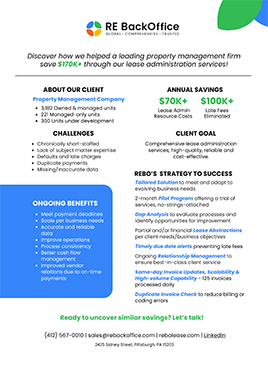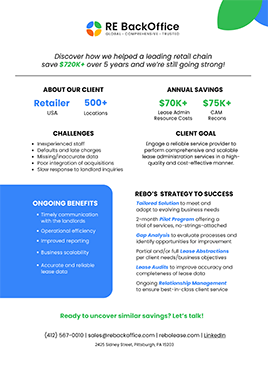
In the dynamic world of commercial real estate, navigating lease agreements is crucial for both tenants and landlords. A key concept within these agreements is the Expiration Date (X-Date), which dictates the official end of the lease term. Understanding X-Dates and their implications for various aspects of commercial property is essential for informed decision-making. This article delves into the world of X-Dates, exploring the different types, their impact on lease negotiations, and strategic considerations for both tenants and landlords.
Early Termination Clauses: Some leases may contain clauses allowing for early termination by either the tenant or the landlord under specific circumstances, such as breach of contract, unforeseen business closures, or condemnation of the property. These clauses usually involve predefined penalties or requirements for finding a replacement tenant.
Grace Periods: Occasionally, leases include a grace period after the X-Date to allow the tenant additional time to vacate the premises or complete any necessary renovations. The terms of this grace period, including potential rent payments, should be clearly outlined in the lease agreement.
Types of Expiration Dates in Commercial Leases
There are two primary types of X-Dates encountered in commercial real estate leases:
Fixed Expiration Date:
This is the most common type, clearly outlining the specific date on which the lease term ends. It provides clarity and predictability for both parties, allowing for strategic planning around lease renewal, relocation, or property disposition.
Term Expiration with Renewal Options:
This X-Date marks the end of the initial lease term but includes provisions for the tenant to extend the lease under pre-defined conditions. These conditions typically involve exercising the renewal option within a specific timeframe (often referred to as "renewal window") and potentially negotiating adjustments to rent, operating expenses, or other lease terms.
Impact of X-Dates on Lease Negotiations
The X-Date plays a significant role in negotiations between tenants and landlords. Here's how it can influence the process:
- Tenant Leverage: A longer lease term with a fixed X-Date can provide tenants with leverage during negotiations. Landlords may be more willing to offer concessions on rent or other lease terms to secure a stable, long-term tenant.
- Landlord Flexibility: A shorter lease term with renewal options offers landlords more flexibility to adjust rent or other terms based on market conditions upon lease renewal.
- Market Conditions: The prevailing market conditions significantly impact X-Dates. In a tenant-favorable market with high vacancy rates, landlords might offer longer lease terms with fixed X-Dates to attract tenants. Conversely, a landlord's market with low vacancy rates could lead to shorter lease terms with renewal options, giving landlords more control over rent adjustments.
- Tenant Needs: The specific needs of the tenant also influence X-Date negotiations. Businesses with long-term investment plans might seek longer leases for stability, while those with short-term growth projections might opt for shorter terms with renewal options for flexibility.
Strategic Considerations for Tenants and Landlords
Understanding X-Dates is crucial for making informed decisions during lease negotiations. Here are some strategic considerations for both parties:
For Tenants:
- Long-Term Planning: Consider your business's future growth projections. A longer lease term with a fixed X-Date might be ideal for stability if you anticipate steady growth.
- Market Analysis: Research current market trends in your desired location. Is it a tenant-favorable or landlord-favorable market? Understanding market conditions can help you leverage your position during negotiations.
- Renewal Options: Carefully review renewal options, including the timeframe for exercising them and potential adjustments to rent or other terms. Negotiate favorable renewal terms upfront to avoid surprises later.
- Early Termination Clauses: Review early termination clauses and associated penalties. Ensure there's enough flexibility if unforeseen circumstances necessitate leaving the property before the lease ends.
For Landlords:
- Market Conditions: Consider the current market situation when determining lease terms. In a tenant-favorable market, shorter leases with renewal options might be more strategic.
- Tenant Creditworthiness: Evaluate the tenant's creditworthiness. Longer lease terms with reliable tenants can provide stable income flow.
- Flexibility for Future Market Shifts: Include renewal options with the ability to adjust rent based on prevailing market conditions at the time of renewal.
- Early Termination Clauses: Clearly define early termination clauses, outlining associated penalties and procedures for finding replacement tenants.
Understanding X-Dates in commercial real estate leases is essential for both tenants and landlords. By considering the different types of X-Dates, their impact on negotiations, and implementing strategic approaches, both parties can navigate the lease agreement process effectively. A well-negotiated X-Date can provide stability, predictability, and flexibility, fostering a successful and long-term commercial property experience.


